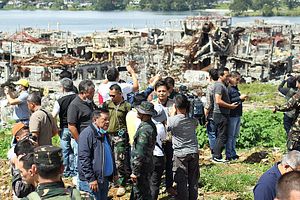Earlier this week, news surfaced that U.S. and Philippine officials were in the process of finalizing a new program to address the root causes of violent extremism amid continuing challenges on this front in the Philippines’ south. While the development was by no means surprising, it nonetheless spotlighted a component of Washington’s ongoing approach to addressing terrorism and violent extremism in the Philippines and in Southeast Asia more generally, which remains a key concern for policymakers.
As I have noted before in these pages, the United States and the Philippines, two treaty allies, share a defense relationship that runs across a series of areas, including counterterrorism. While the focus is often on more military aspects of this, be it new exercises or equipment transfers, the U.S. approach has also sought to address the root causes of radicalization as well. Those factors help increase support for militancy and terrorism, a focus area that has only increased following the 2017 siege by Islamic State-linked militants in Marawi city.
That focus on counterterrorism has continued on over the past year as well. To take just one example, last July, Washington announced that it would contribute 1.418 billion Philippine pesos ($26.5 million) over two years to boost counterterrorism support for Philippine law enforcement agencies, covering training, equipment, and other support to build up law enforcement capacity to block terrorist operations, funding, and movement; investigate and prosecute terrorism cases; and counter radicalization to violence and violent extremism. And just last month, the United States and the Philippines partnered in a training program that covered effective investigations and prosecutions of terrorism cases involving the two countries as well as Indonesia.
Earlier this week, these joint counterterrorism efforts were in the spotlight again. Denise Natali, the assistant secretary of the State Department’s Bureau of Conflict and Stabilization Operations, told journalists at a briefing that the United States was in the process of finalizing a new three-year program and partnership with the Philippine government to address the underlying vulnerabilities that create the conditions for rising violent extremism. Her comments came as part of a wider trip where she was to meet Philippine officials including its national security adviser.
While Natali did not offer much specifics about the program itself, which is designed to help government and nongovernment actors to design and implement projects to counter extremism, she emphasized that the focus would be on evidence-based approaches. Her comments came in the context of efforts by U.S. institutions that have helped shed more light on this of late, including one study by Development Associates International (DAI) to support the U.S. Agency for International Development (USAID) in the Philippines. The 2018 study found that less than half of assumed drivers of extremism actually significantly predicted support for it, and that aspects such as family and community networks, community marginalization and discrimination, and greater acceptance of revenge seeking and gun culture contributed more to radicalization than specific grievances or social and economic factors.
To be sure, it is still early days, and how exactly the program will play out – from the exact budget allocation to its implementation – remain to be seen. But the focus on it has helpfully spotlighted the broader nature of U.S. efforts to help Southeast Asian states counter terrorism and violent extremism, which remains a longer-term challenge beyond an episodic focus on individual groups such as al-Qaeda or the Islamic State or periodic crises such as the 2017 Marawi siege.
































